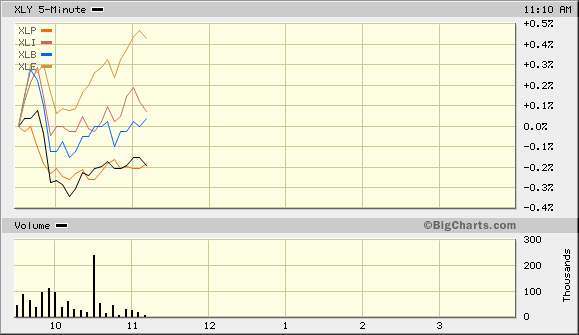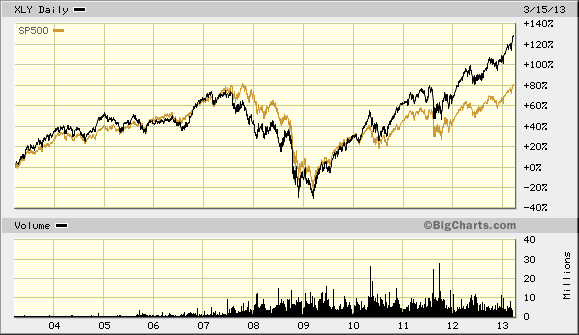What does it mean when we learn that consumer sentiment drops to the lowest level since 12/2011? For the bulls, it means that any setback in consumer “feelings” will be offset by the Federal Reserve’s easy money policy; that is, the Fed will not quit its bond-buying, interest rate lowering until exceptional employment prospects spur greater consumption.
For the bears, however, many believe the writing for a substantive sell-off is on the “Wall.” In spite of the fact that SPDR Select Consumer Discretionary (XLY) and SPDR Select Consumer Staples (XLP) have been notching high after all-time high, both fell further on 3/15/2013 than most of the other key sector ETFs.
Naturally, bulls regard the slight selling pressure as little more than a knee-jerk reaction. They are also pointing to the fact that what consumers feel (sentiment) often does not correspond to what they do with their money.
Not surprisingly, the bearish guidance involves a “Sell in April and Avoid a Pain Pill” opportunity. They contend that Q1 2013 earnings will show the adverse effects of the lower take-home pay that began at the start of the year. And the bears decry that the automatic spending cuts that began last month will inevitably reduce government jobs; they believe the numbers will look dismal in the March and April labor stats.
It may be beneficial to take a longer-term view of Consumer Discretionary (XLY) to take a quick respite from the bull-bear debate. Over the last decade, then, what can we learn about the performance of XLY relative to the broader S&P 500 benchmark?
The chart above is incredibly intriguing. The most obvious thing that pops out is the fact that an unwavering faith in the strength of the U.S. consumer resulted in a total return that was 50% (5000 basis points) greater than buying-n-holding the benchmark. On the surface, this would seem unassailable proof that the consumer sector has its advantages.
Yet the first 6 years of the decade showed little difference in performance whatsoever. In fact, due to the housing collapse, the downside slide in consumer spending began first with XLY during the 2007-2009 stock market crisis. Still, the end result after 6 years was decidedly similar.
So if our current 4-year bull market tells us anything, it tells us the power of the Fed’s quantitative easing; that is, if the central bank is able to keep interest rates below free market levels — if government powers can create an environment where consumers will borrow to buy home appliances, cars and 54-inch TVs — consumer-oriented companies can crush earnings expectations. Better earnings result in higher stock prices… higher stock prices fuel momentum and even higher stock prices.
There’s only one problem with the idea that funds like Vanguard Consumer Discretionary (VCR) or SPDR Select Consumer Discretionary (XLY) are unbreakable. The problem? Reversion to the mean.
History teaches us time and again that outperforming sectors become underperforming sectors and vice versa. In this case, XLY’s stratospheric rise over the last 4 years is likely to revert back to the mean performance of the S&P 500. Right now, that’s a fairly depressing pullback.
Nevertheless, don’t expect Consumer ETFs to flounder overnight. Since its remarkable success is largely tied to the low interest rates that consumers have enjoyed — since the Fed isn’t going to let rate increases harm a perception that employment/GDP progress is just around the bend — Consumer ETFs should be able to hold their own.
If you’re worried about rising rates, however, you might consider diversifying in the space. Market Vectors Retail (RTH) diversifies between defensive toilet paper and tooth paste stocks as well discretionary spending at Amazon (AMZN) and Home Depot (HD). iShares Global Consumer Staples (KXI) diversifies 50% with non-U.S. brand name biggies like Unilever (UL) and Nestle (NSRGF).
Disclosure: Gary Gordon, MS, CFP is the president of Pacific Park Financial, Inc., a Registered Investment Adviser with the SEC. Gary Gordon, Pacific Park Financial, Inc, and/or its clients may hold positions in the ETFs, mutual funds, and/or any investment asset mentioned above. The commentary does not constitute individualized investment advice. The opinions offered herein are not personalized recommendations to buy, sell or hold securities. At times, issuers of exchange-traded products compensate Pacific Park Financial, Inc. or its subsidiaries for advertising at the ETF Expert web site. ETF Expert content is created independently of any advertising relationships.
- English (UK)
- English (India)
- English (Canada)
- English (Australia)
- English (South Africa)
- English (Philippines)
- English (Nigeria)
- Deutsch
- Español (España)
- Español (México)
- Français
- Italiano
- Nederlands
- Português (Portugal)
- Polski
- Português (Brasil)
- Русский
- Türkçe
- العربية
- Ελληνικά
- Svenska
- Suomi
- עברית
- 日本語
- 한국어
- 简体中文
- 繁體中文
- Bahasa Indonesia
- Bahasa Melayu
- ไทย
- Tiếng Việt
- हिंदी
Will The Worst Sentiment Reading Since 12/2011 Rattle Consumer ETFs?
Published 03/17/2013, 02:55 AM
Updated 03/09/2019, 08:30 AM
Will The Worst Sentiment Reading Since 12/2011 Rattle Consumer ETFs?
3rd party Ad. Not an offer or recommendation by Investing.com. See disclosure here or
remove ads
.
Latest comments
Install Our App
Risk Disclosure: Trading in financial instruments and/or cryptocurrencies involves high risks including the risk of losing some, or all, of your investment amount, and may not be suitable for all investors. Prices of cryptocurrencies are extremely volatile and may be affected by external factors such as financial, regulatory or political events. Trading on margin increases the financial risks.
Before deciding to trade in financial instrument or cryptocurrencies you should be fully informed of the risks and costs associated with trading the financial markets, carefully consider your investment objectives, level of experience, and risk appetite, and seek professional advice where needed.
Fusion Media would like to remind you that the data contained in this website is not necessarily real-time nor accurate. The data and prices on the website are not necessarily provided by any market or exchange, but may be provided by market makers, and so prices may not be accurate and may differ from the actual price at any given market, meaning prices are indicative and not appropriate for trading purposes. Fusion Media and any provider of the data contained in this website will not accept liability for any loss or damage as a result of your trading, or your reliance on the information contained within this website.
It is prohibited to use, store, reproduce, display, modify, transmit or distribute the data contained in this website without the explicit prior written permission of Fusion Media and/or the data provider. All intellectual property rights are reserved by the providers and/or the exchange providing the data contained in this website.
Fusion Media may be compensated by the advertisers that appear on the website, based on your interaction with the advertisements or advertisers.
Before deciding to trade in financial instrument or cryptocurrencies you should be fully informed of the risks and costs associated with trading the financial markets, carefully consider your investment objectives, level of experience, and risk appetite, and seek professional advice where needed.
Fusion Media would like to remind you that the data contained in this website is not necessarily real-time nor accurate. The data and prices on the website are not necessarily provided by any market or exchange, but may be provided by market makers, and so prices may not be accurate and may differ from the actual price at any given market, meaning prices are indicative and not appropriate for trading purposes. Fusion Media and any provider of the data contained in this website will not accept liability for any loss or damage as a result of your trading, or your reliance on the information contained within this website.
It is prohibited to use, store, reproduce, display, modify, transmit or distribute the data contained in this website without the explicit prior written permission of Fusion Media and/or the data provider. All intellectual property rights are reserved by the providers and/or the exchange providing the data contained in this website.
Fusion Media may be compensated by the advertisers that appear on the website, based on your interaction with the advertisements or advertisers.
© 2007-2024 - Fusion Media Limited. All Rights Reserved.
